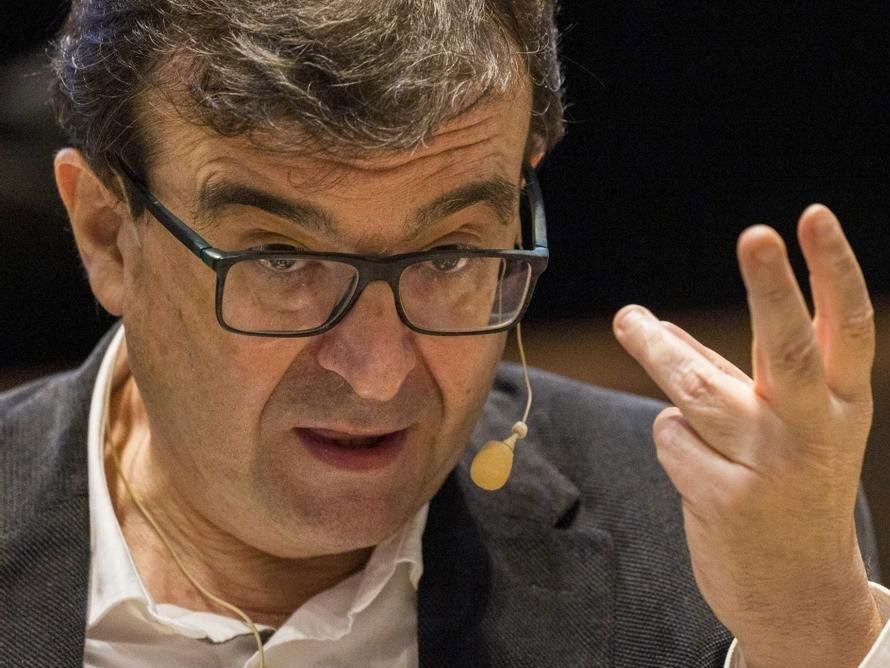JAVIER CERCAS at Oxford Literary Festival – THE WRITER AS TROUBLEMAKER

As part of this year’s Oxford Literary Festival, the celebrated Spanish writer Javier Cercas came to Lincoln College on Saturday March 23rd, to be interviewed by Boyd Tonkin.
Cercas achieved global fame in 2001 with Soldiers of Salamis, a novel which is ostensibly a piece of historical investigation into the Spanish Civil War. He continued to address controversial aspects of Spanish history with “Anatomy of a Moment” (2009) about the attempted coup d’état of February 23rd 1981. He is happy to acknowledge that this sensitive subject-matter has earned him something of a reputation as a troublemaker.
It can be justifiably asserted that “Soldiers of Salamis” creates a new literary genre known as Ficción Histórica. Cercas mixes factual research with fiction, without making the distinction between them clear, and creating a kind of detective novel, where the plot advances through a series of journalistic interviews who offer their evidence to the narrator.
Competing hagiographies.
In “Soldiers of Salamis” a journalist, coincidentally named Cercas, becomes fixated on a Fascist named Rafael Sánchez Mazas, who has had a miraculous escape from a firing squad before evading capture by the Republican militias. Franco’s Nationalists arrive, and the myth (or factual story) becomes embedded in right-wing hagiography, which Sánchez Mazas himself plans to write about in a book that he will call “Soldiers of Salamis.” However, the journalist discovers that Sánchez Mazas in fact owes his life to an unknown Republican, who has the Fascist at his mercy, but spares his life. In the final section of the novel, the journalist searches frantically to track down the unknown soldier, seeing him as the perfect antithesis to Sánchez Mazas. Through Roberto Bolaño (a real-life author from Chile) the journalist learns about Miralles, a veteran of General Líster’s Republican campaigns, who joined the Free French, marched across Africa, and helped to liberate Paris, ending up in a Nursing Home in Dijon. Is he the merciful Republican? Is it too late to track him down and create a truer, better myth than the one perpetuated by the Fascists?
Cercas explains the extraordinary success of Soldiers of Salamis, saying that it met a need of Spanish society at the turn of this century, the need to address its memories and to cope with its past. “People say the Civil War lasted three years”, says Cercas, “they are wrong; it lasted forty years, and more. The Transition to Democracy was accompanied by what has been called the Pact of Forgetfulness. But nobody forgot; they lived each day with their memories, and the fear that the killing might start again.”
Javier Cercas reveals that an aspect of his own family troubled and fascinated him as he began to write. His mother venerated an uncle who had joined Franco’s army and died in the Battle of the Ebro, creating a “family myth of heroism” that Cercas went on to regard as an embarrassment. “What do we, as Spaniards, do with our past?” is a question he asks with urgency.
Cercas is animated as he talks, grasping Boyd Tonkin’s arm to emphasise a point, leaning in to the microphone as his words crackle and his ideas detonate. “Lies are the worst military weapon in the world”, he says. Then, justifying his exploring of Spain’s historical memories, “An author can be an alchemist, transforming pain into beauty.”
Cercas’ two latest works are in the form of detective investigations: Even the Darkest Night and Prey for the Shadow. He explains this, saying “In one way or another, all great novels are detective novels”
Then, in a conversation that has been studded with memorable aphorisms, he goes on to quote T.S. Eliot
“Time present and time past are both perhaps present in time future”.
And, warming to this theme, he concludes “We must not allow power to manipulate the past in order to control the present and the future.”